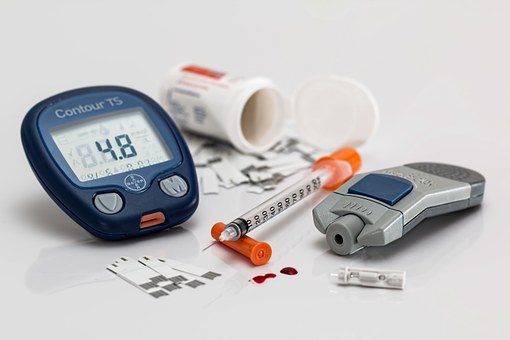Globally the prevalence of diabetes in adults (18 years and older) is 8.5 %. An estimated 1.5 million deaths are directly linked to diabetes each year in addition to 2.2 million deaths attributable to high blood glucose levels. Diabetes is a chronic metabolic disorder characterized by high glucose levels in the blood caused by insulin-related abnormalities within the body.
Insulin is a peptide hormone produced by the beta cells of the pancreas. This hormone facilitates the production of energy from glucose provided by carbohydrates in the food we consume. The hormone is also responsible for keeping the blood sugar level from getting too high (hyperglycemia) or too low (hypoglycemia)
Based on the relationship with insulin diabetes is categorized into two; type 1 diabetes and type 2 diabetes
Type 1 diabetes: this type of diabetes is also known as juvenile diabetes it arises when the body does not make insulin or does not make enough insulin as a result of the destruction of the pancreatic cells responsible for the production of the hormone by the immune system
Type 2 diabetes: in this case the body produces insulin but the cells of the body do not use it as well as they should, As such the pancreases move to produce more insulin to improve uptake of glucose by the cells. This continues until the pancreas weakens and cannot keep up leading to the accumulation of sugar in the blood.
Generally, people use portable blood glucose meters, called glucometers, to check their blood sugar levels. These work by analyzing a small amount of blood, usually from a fingertip. A lancet lightly pricks your skin to obtain the blood. Meters tell you your current blood sugar. However new technologies like the cgm system mobile app have now made it possible for millions around the globe to generate updated glucose readings throughout the day, predictive alerts, and the ability to share vital information with healthcare providers on a real-time basis.
Symptoms of Diabetes
Diabetes is a chronic medical condition characterized by high levels of blood glucose (sugar). The symptoms of type 1 and type 2 diabetes can overlap, but they can also have some distinct differences. Here are the expanded symptoms commonly associated with both types of diabetes:
- Fatigue (Excessive Tiredness): People with diabetes often experience persistent fatigue and a general feeling of tiredness, even after getting enough rest. This is primarily due to the body’s inability to use glucose effectively, leading to energy imbalances.
- Slow Healing of Wounds: Both type 1 and type 2 diabetes can impair the body’s ability to heal wounds. High blood sugar levels can damage blood vessels and reduce blood flow to injured areas, delaying the healing process and making wounds more susceptible to infection.
- Increased Urination (Polyuria): Frequent urination is a common symptom of diabetes, especially in uncontrolled cases. Excess glucose in the blood spills into the urine, pulling water with it. This leads to increased urine production and subsequently increased trips to the bathroom.
- Blurred Vision: High blood sugar levels can cause the lens of the eye to swell, leading to blurred vision. Blurred vision is often temporary and can improve with better diabetes management.
- Yeast Infections: People with diabetes may be more susceptible to yeast infections, such as thrush (oral candidiasis) in the mouth and genital yeast infections (vaginal or penile). High levels of glucose in bodily fluids create a favorable environment for yeast to grow and cause infections.
- Urinary Tract Infections: The increased sugar content in urine can provide a breeding ground for bacteria, leading to an increased risk of urinary tract infections (UTIs). UTIs can cause discomfort and frequent urination.
- Excessive Thirst (Polydipsia): Uncontrolled diabetes can lead to excessive thirst as the body tries to compensate for the fluid lost through increased urination. This symptom often accompanies polyuria.
- Unexplained Weight Loss: In type 1 diabetes, the body lacks insulin, leading to the breakdown of fat and muscle tissues for energy. This can result in unexplained weight loss, despite increased hunger and food intake.
- Skin Problems: Diabetes can affect the skin, leading to dryness, itching, and a higher susceptibility to skin infections. Poorly controlled diabetes can also cause acanthosis nigricans, a skin condition characterized by darkened patches of skin, commonly on the neck and armpits.
- Increased Hunger (Polyphagia): In some cases of uncontrolled diabetes, the body’s cells may not be able to access glucose for energy, leading to persistent hunger and increased appetite, especially after eating.
It is important to note that some individuals with type 2 diabetes may have milder or fewer symptoms, and the condition may go undiagnosed for a long time. Regular health check-ups, blood glucose monitoring, and awareness of potential symptoms can aid in early detection and proper management of diabetes. If you or someone you know is experiencing any of these symptoms, it is essential to seek medical advice for a timely diagnosis and appropriate treatment.
Causes of Diabetes
- Genetics: Genetics play a significant role in the development of diabetes. A family history of diabetes increases the risk of an individual developing the condition. Certain ethnic groups, such as Africans, Latinos, African Americans, Native Americans, Asian Americans, and Pacific Islanders, have a higher predisposition to diabetes compared to others.
- Excess Weight: Obesity and excess weight are strong risk factors for developing type 2 diabetes. In individuals who are overweight or obese, the body’s cells may become resistant to insulin, leading to elevated blood sugar levels and the onset of diabetes. This link between obesity and diabetes is particularly prominent in children, teenagers, and adults.
- High Carbohydrate Diets: Diets that are high in carbohydrates, especially refined and sugary carbohydrates, can significantly increase the risk of diabetes. Regularly consuming large amounts of sugary foods and drinks can lead to insulin resistance and imbalances in blood sugar levels.
- Sedentary Lifestyle: A lack of physical activity and a sedentary lifestyle contribute to the development of diabetes. Regular exercise helps improve insulin sensitivity, allowing the body to use glucose more efficiently. Sedentary individuals may have a higher risk of insulin resistance and type 2 diabetes.
- Carbonated Drinks and Artificial Sweeteners: Consuming sugary carbonated drinks and foods containing artificial sweeteners has been linked to an increased risk of diabetes. These beverages and sweeteners can cause rapid spikes in blood sugar levels, contributing to insulin resistance over time.
- Gestational Diabetes: Pregnant women may develop gestational diabetes, a temporary form of diabetes that occurs during pregnancy. Gestational diabetes increases the risk of both the mother and the baby developing type 2 diabetes later in life.
- Age and Lifestyle Choices: Advancing age is a risk factor for diabetes, especially type 2 diabetes. As people age, the body’s ability to produce and use insulin may decline. Lifestyle choices, such as poor dietary habits, physical inactivity, and smoking, can further increase the risk of developing diabetes.
- Hormonal Imbalances: Certain hormonal conditions, such as polycystic ovary syndrome (PCOS) and Cushing’s syndrome, can disrupt insulin production and lead to insulin resistance, increasing the risk of diabetes.
- Pancreatic Disorders: Damage or dysfunction of the pancreas, the organ responsible for producing insulin, can lead to diabetes. Conditions like chronic pancreatitis or pancreatic cancer can impair insulin production.
- Medications and Illnesses: Certain medications, such as corticosteroids and antipsychotic drugs, can affect blood sugar levels and increase the risk of diabetes. Infections or illnesses that cause inflammation can also impact insulin sensitivity and contribute to diabetes development.
It is essential to be aware of these risk factors and take preventive measures to reduce the risk of developing diabetes. Maintaining a healthy lifestyle, including a balanced diet, regular exercise, and regular health check-ups, is crucial for diabetes prevention and overall well-being. If you have any concerns about diabetes or its risk factors, consult with a healthcare professional for personalized guidance and advice.
Treatment
The treatment of diabetes depends on the type of diabetes, its severity, and the individual’s overall health. In general, the primary goals of diabetes treatment are to manage blood sugar levels, prevent complications, and improve overall well-being. Treatment options for diabetes include:
Lifestyle Changes
For individuals with prediabetes or early-stage diabetes, lifestyle changes may be sufficient to manage the condition. These changes may include adopting a balanced and healthy diet, engaging in regular physical activity, and maintaining a healthy weight. Avoiding smoking and limiting alcohol consumption are also important lifestyle factors in diabetes management.
Medications
Medications are often prescribed to control blood sugar levels in individuals with diabetes. The type of medication depends on the type of diabetes and individual needs. For type 1 diabetes, insulin therapy is essential, as the body does not produce insulin. For type 2 diabetes, various oral medications and injectable medications are available that can help the body use insulin more effectively or improve insulin production.
Insulin Therapy
Individuals with type 1 diabetes and some with type 2 diabetes may require insulin therapy. Insulin can be delivered via injections or insulin pumps. The dosage and type of insulin depend on individual blood sugar levels and other factors.
Blood Sugar Monitoring
Regular monitoring of blood sugar levels is essential for individuals with diabetes. This helps in understanding how well treatment is working and allows adjustments to medication and lifestyle as needed.
Healthy Diet
A well-balanced and nutritious diet is crucial for diabetes management. It should include a variety of fruits, vegetables, whole grains, lean proteins, and healthy fats. Avoiding sugary and highly processed foods is essential to prevent spikes in blood sugar levels.
Physical Activity
Regular physical activity helps in improving insulin sensitivity and managing blood sugar levels. Engaging in aerobic exercises, strength training, and other forms of physical activity can be beneficial for diabetes management.
Weight Management
Maintaining a healthy weight is important, especially for individuals with type 2 diabetes or those at risk of developing diabetes. Weight loss, if necessary, can improve insulin sensitivity and blood sugar control.
Diabetes Education and Support
Diabetes education and support programs can provide valuable information about managing the condition, making lifestyle changes, and coping with the challenges of diabetes. These programs can also offer emotional support for individuals living with diabetes.
Regular Check-ups
Regular check-ups with healthcare professionals are essential for monitoring blood sugar levels, managing medications, and assessing overall health and potential complications related to diabetes.
Natural Remedies
A recent study has offered a new ray of hope for those with diabetes. Scientists at the University of Medical Sciences in Yazd, Iran evaluated the effects of ginger (Zingiber officinale) on plasma glucose level, HbA1c and insulin sensitivity in type 2 diabetic patients the results showed that
- Taking 1 gram of grounded ginger 3 times daily for 8 weeks will reduce your blood glucose level by 10.5%
- Taking 1 gram of grounded ginger 3 times daily for 8 weeks will reduce your HBA1c levels
- Measurements of insulin resistance and insulin sensitivity were significantly better among those taking 1 gram of grounded ginger 3 times daily.
These findings open an important vista in the management of diabetes as it opens a significant window of hope to the millions that are suffering from the condition, especially in low and middle-income countries where access to anti-diabetic drugs is limited due to financial constraints.t is crucial for individuals with diabetes to work closely with their healthcare team to develop a personalized treatment plan that meets their specific needs and goals. Diabetes is a lifelong condition, and successful management involves ongoing self-care, regular follow-ups, and proactive lifestyle choices. See Health Benefits of Bitter leaf
Copyright ©
Permission is hereby granted for the use of whole or parts of this article provided appropriate credit is given to www.publichealth.com.ng
Public Health Nigeria an Interdisciplinary public health movement focused on health education, advancing fair public health policies, promoting fitness, healthy diets, responsible behavior, community health and general well-being.






Greetings! Very useful advice within this post! It is
the little changes that make the biggest
changes. Thanks for sharing!